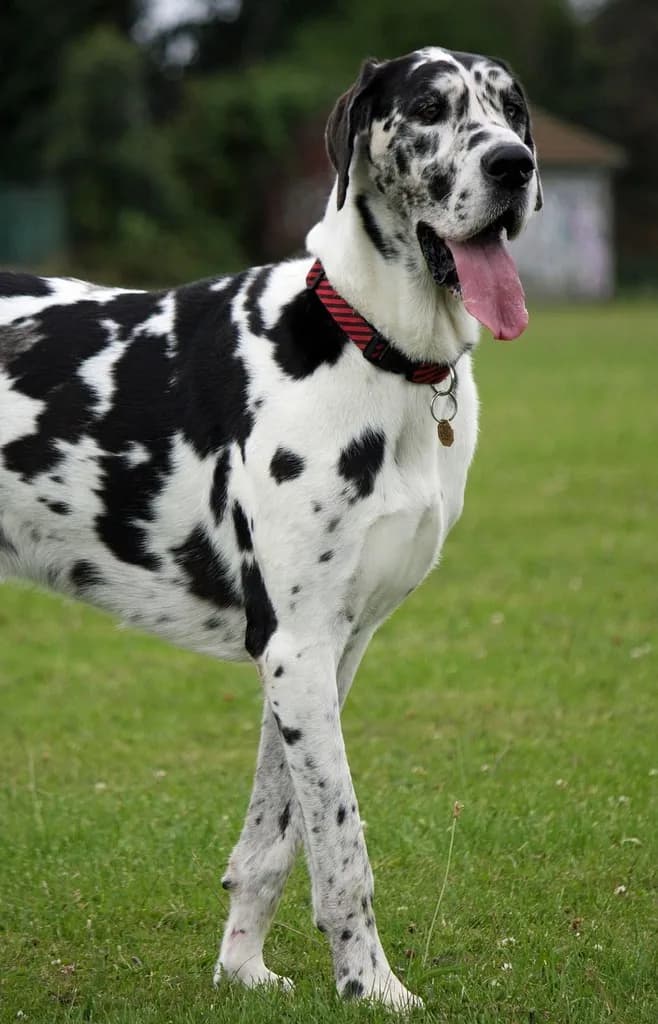Great Dane

Height
Male: 66-86 cm, Female: 66-86 cmWeight
Male: 45-91 kg, Female: 45-91 kgPedigree
YesLifespan
7 to 10 yearsPros
- Gentle giants
- good with children
- relatively low energy indoors
- intelligent and trainable
- loyal and affectionate
- impressive appearance
- can be good watchdogs (deterrent factor)
- relatively short coat (easier grooming).
Cons
- High cost of ownership (food
- vet bills)
- short lifespan
- prone to bloat (gastric torsion)
- potential for heart problems
- can be clumsy and unaware of their size
- drooling
- shedding
- training can be challenging due to size and stubbornness
- potential for hip dysplasia
- can be destructive if bored or not properly trained
- not ideal for small living spaces.
Introduction to the Great Dane
The Great Dane, often dubbed the "gentle giant," is a breed known for its imposing size and elegant demeanor. Despite their large stature, Great Danes are generally friendly, affectionate, and make excellent family companions. They are known for their loyalty and protective nature, making them good watchdogs, although their size alone is often enough to deter intruders.
Great Danes require early socialization and training to ensure they develop into well-behaved adults. Their size can make them challenging to manage if not properly trained. However, with consistent guidance, they are eager to please and relatively easy to train. They thrive on companionship and enjoy being involved in family activities.
History of the Great Dane
The Great Dane's origins can be traced back to ancient times, with evidence of similar dogs appearing in artwork from Greece and Egypt. However, the modern Great Dane as we know it today was developed in Germany. They were originally bred to hunt wild boar, hence their other nickname "boarhound".
Over time, the Great Dane transitioned from a hunting dog to a noble companion. They were often kept in castles and large estates, prized for their size, strength, and elegant appearance. The breed standard was formalized in the late 19th century, solidifying their characteristics and ensuring consistency in breeding.
The Great Dane has remained a popular breed throughout the world, admired for its unique combination of size, grace, and gentle temperament. They continue to be cherished as family pets and companions, bringing joy and love to their owners' lives.
Interesting facts about the breed
- Great Danes are one of the tallest dog breeds in the world.
- Despite their size, they are known for being gentle and affectionate.
- They have a relatively short lifespan compared to other breeds.
- Great Danes come in a variety of colors, including brindle, fawn, blue, black, and harlequin.
- They are prone to certain health issues, such as bloat and hip dysplasia.
Characteristics
Apartment Suitable
Beginner Friendly
Hardiness
Independence
Tolerates Cold
Tolerates Hot
Friendliness
Affectionate With Family
Kid Friendly
Dog Friendly
Stranger Friendly
Grooming
Shedding
Drools
Ease of Grooming
Health
Gains Weight
Ease Of Training
Intelligence
Prey Drive
Vocality
Wanderlust
Need for Attention
Activeness
Intensity
Excercise Needs
Are you looking to buy the Great Dane breed?
See current available pets or share this breed with your friends!